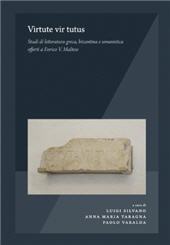"Perché tramonti, o sole?" : la poesia di Manuele Olobolo per la prokypsisdi Anna di Ungheria : linguaggio metaforico e rilevanza politica
P. 183-205
This paper offers a critical edition (with Italian translation) of one of the 20 prokypsis poems written by the rhetor ton rhetoron Manuel Holobolos between 1265 and 1273. The text is transmitted by two manuscripts, Paris, BnF, gr. 400 (a. 1335-36), f. 112v-113r (A) and Meteora, Monê Metamorphôseôs 357 (a. 1609/10), f. 29r (D). Though the second manuscript has no relevance to the constitutio textus if one considers its poor spelling and recent date, it offers an intitulatio that better fits the poem's subject matter and probably derives from an older manuscript not identical with A. The poem stands out among the rest of the prokypsis compositions, for it is the only one which was not written and recited within the framework of the public celebrations at Epiphany and/or Christmas.
The occasion was, instead, the wedding between the young emperor Andronikos II and the Hungarian princess Anna, probably in the summer of 1272. Consequently, the poem displays a very different imagery focused on the traditional comparison of the bride and groom with the sun and moon. The major role given to the bride, the actual addressee of the poem, is remarkable, as the intitulatio in D aptly attests. This unusual emphasis on the bride and the great honors bestowed on her may be due to the importance of the marriage alliance with the Hungarian kingdom as a means of defense against the aggressive Eastern policy of the Angevins of Naples. [Publisher's text]
-
Chapters from the same volume (available individually)
-
Information
ISBN: 9789464753127


